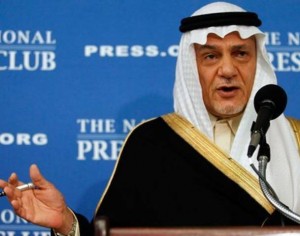Special to WorldTribune.com
ABU DHABI — Saudi Arabia has been leading a Gulf Arab effort to
conduct an independent security policy that was not dependent on the United
States.
Diplomats and analysts said one option has been to strengthen relations with China, a
nuclear power that has been searching for additional energy supplies.

On Jan. 15, China and Iran signed a nuclear cooperation agreement that envisioned Beijing’s assistance for a nuclear energy program in the GCC kingdom. The agreement came in wake of Saudi threats to match Iran’s nuclear weapons program.
“The Gulf states had long looked to Washington to be their protector,” Kuwait Center for Strategic Studies president Sami Al Faraj said. “They still have the United States, but the Gulf is increasingly looking around and saying: ‘We need to take care of ourselves, too.’ ”
The sources said Saudi King Abdullah and Crown Prince Nayef
were working with a range of foreign countries in a policy that would leverage
the Gulf Cooperation Council’s huge energy production to counter neighboring
Iran.
“Any threat to our interests or security will force us to use all
available options to defend our interests, and national and regional security,” former Saudi intelligence chief Prince Turki Al Faisal said.
Addressing a security conference in Bahrain on Jan. 17, Turki, also a former ambassador to Britain and the United States, raised the prospect of a
war with Iran. Turki, believed to be speaking for the Saudi leadership,
cited Iranian threats to block the Strait of Hormuz, the passage for 40
percent of global crude oil shipments.
“The mounting escalation and persistent tensions might end up in an
adventure with unpredictable consequences or in an unwanted military
confrontation,” Turki said.
Analysts and diplomats assert that the Saudi royal family has been
frustrated by the U.S. hesitation to stop Iran. They cited the refusal by
the administration of President Barack Obama to sign tough sanctions
legislation that targeted Iran’s energy sector.
“The Gulf states are definitely taking a stronger stance against Iran
and are using their considerable influence to try to convince others of
their Iranian fears,” Theodore Karasik, an analyst at the Institute for Near
East and Gulf Military Analysis in the United Arab Emirates, said.
Currently, the GCC, led by the Saudis, were engaged in a massive
military buildup. Riyad has ordered about $30 billion worth of fighter-jets
and munitions from the United States while the UAE was expected to purchase
another $20 billion from Washington.
At the same time, the GCC was moving to replace Iran as the energy
supplier to key countries, including China, Japan and South Korea. The GCC
effort, again led by Riyad, has prompted Iranian threats.
“These acts will not be considered friendly,” Iran’s envoy to OPEC,
Mohammed Ali Khatibi, said.

You must be logged in to post a comment Login